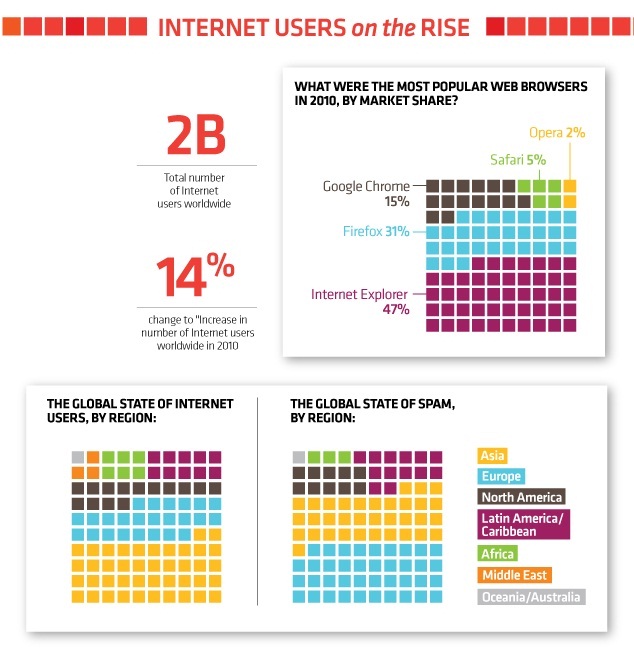There is zero doubt that 2010 was a booming year for the Internet. Social media emerged as a driving force for online and real-life activities with Facebook and Twitter continuing to lead the charge. Social news had some shakeups and shifts that put sites like Reddit on top.
Email is still relevant despite many pointing to its demise. Internet use in general is going up (of course) but the way we access the Internet seems to be changing.
To know what 2011 holds for us, it’s good to look back at where we’ve been. Thanks to our friends at Focus, we can do just that. This graphic puts it all into perspective and gives us a visual depiction of what the year really looked like online.
Click to enlarge.



Interesting numbers, the ever increasing number of internet data, websites, social media sharing indicates a whole new life style through out the world. I however wonder how much of the sites are spamming or what is the %age of data being spammed.
Largest Ever study of The Internet in Britain has just been Published
The British Population Survey has just released the latest report on Internet Access in Britain.
The report titled ‘The Internet – Engagement and Use in Britain’ uses over 250,000 individual face to face interviews to assess both who has internet access and who does not and how this has changed over the past 3 years.
The report also covers how people access the internet, what they use it for, who shops on line and how people react to internet advertising and email marketing.
Some facts from the report:
The biggest growth sector in terms of access to the internet are the over 65s. Interestingly, it is not just as younger internet users’ move into that age group but also those who are over 65 are increasingly gaining access.
More over 55s have access than under 25s.
The younger age groups (under xx) find internet advertising more acceptable than Email marketing but the opposite is true for the older age groups.
Over 10 million people, or 1 in 5 of our population are without internet access, out of those,
three quarters have only GCSEs or NVQ 1 or no qualifications; 40% of them are in the D and E social grades; 70% are over 55 and 70% live in the North and Midlands.
Out of every 10 people, aged 15 and over, in the country:-
9 have a mobile phone
8 have internet access
8 have a landline telephone
7 use email
6 have a laptop or netbook computer
5 shop online
4 use social networks and blogs
4 use online banking
4 have a games console
3 have an MP3 player
2 download music
2 watch TV online
1 buys groceries online
0 (or very near 0) admit to using online dating!
Full details are available at http://www.thebps.co.uk.